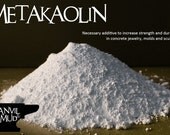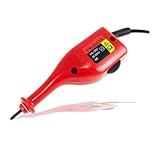1. "Why is my work cracking? I remove it from a mold (or some other process) and a few days later I pick it up and it's cracked/broken." Almost invariably my first response is that you used too much water in the mix. The mix is too wet. For those who have worked in plaster, you must realize this is a completely different material. As a general rule, the LESS water you use, the better. You should be able to form a ball in your hand with the mix and stand it up on the table and it should not slump (or crack apart if it is too dry). It has to be damp, but not wet. Why is this? Doesn't concrete need lots of water to work? No, it only needs enough water to hydrate (chemically combine) with the particles of Portland cement. This is a chemical reaction, not a drying process. Any more than that minimal amount of water and you are left with tiny spaces in the final product which weakens it.
Next, you have to keep the work covered with plastic sheet for about a week so that all the water you put into it becomes hydrated with the cement, and not allowed to evaporate into the air. If the surface dries before it sets your final product will have a weak surface – read "soft, dusty." If you use too much water the concrete will also shrink more than it should. This can cause cracking as well. You can compensate for this by using lots of fibres (nylon, polypropylene, fibreglass, PVA.) Let the piece cure for at least a week before handling it. You can do surface work before this – carving, filing, adding a slurry to fill holes, etc. – but you must be very careful. Even after that week I like to keep work covered or let it sit underwater for another week or so before sealing.
2. "In jewelry, my concrete has shrunk and pulled away from the walls of the piece." See answer to Number 1 above. Too much water means too much shrinking. Use less water and add fibres.
3. "The surface seems soft, dusty, easy to scratch, even after it's cured for a week." I hate to repeat myself, but too-much-water is the probable cause.
4. "Where can I buy metakaolin? You talk about it all the time and I can't find less than a 50 pound bag?" Luckily there is now someone on Etsy selling smaller quantities. https://www.etsy.com/shop/ANVILandMUD/ You can buy as little as two pounds. Unfortunately they only sell it if you are in the United States. Considering this is a white powder in a bag, you can see why they don't want it crossing any international borders.
This Etsy shop quotes a concrete recipe from the Ganoksin Project. I thought it sounded familiar; then I realized I had written that Ganoksin article several years ago. Things come full circle...
5. Last question for this blog entry. "When I pull the object from the mold it is covered with (tiny/large) holes. What's happening?" Concrete contractors call these worm holes. They are from air bubbles in the mix. Depending on the type of mold, you need to vibrate the mix somehow so the bubbles float away from the surface of the mold. Large scale you can rent a concrete vibrator. Small scale you can tap the mold with a stick or a small hammer, all around the mold walls. You can also use an electric palm sander, and let the vibrating surface sit on sections of the mold wall. On the jewellery scale I use a vibrating engraver and hold the tip against sections of the mold. You will see the concrete slightly liquify as you do this. Do not do it excessively or the solids in the mix will start to separate and sink.
You also should try using a mold release agent. There are commercial ones available, some in a spray can, or you can make your own. There are various recipes on the internet, but they are usually oil-based and easy to make. Try to put them on in as thin a layer as possible.


2 comments:
We combined proprietary concrete mix designs to make the ultimate concrete slab. At a third of the cost of conventional slabs, yet twice as strong. Brika slabs are also quicker and easier to install, eliminating cost and the need for scaffolding, concrete pumps and shuttering. Affordable, strong and environmentally friendly, we think that Brika Slabs is truly the last word in concrete slab manufacturing. We provide options Concrete Slab, Hollowcore concrete slabs, precast concrete slabs, echo slabs, concrete products, block and lintel, concrete manufacturer, cheapest way to build a slab and cost effective building.
Good to see these helpful information here,Thanks lots for sharing them with us.
Mold Killing Primer Edmonton
Concrete sealer Saskatoon
Post a Comment